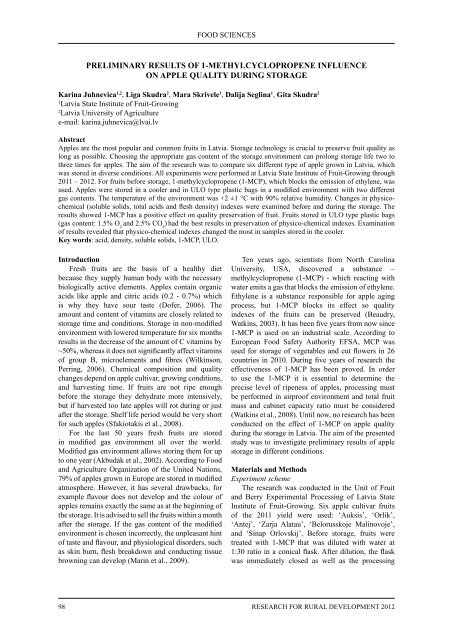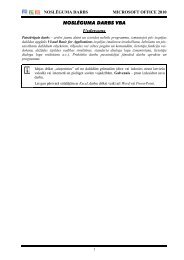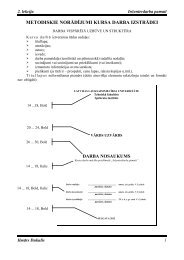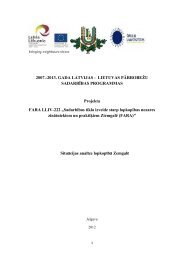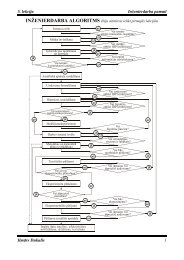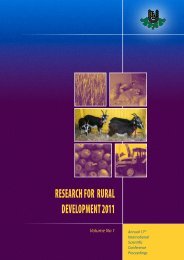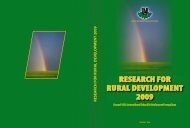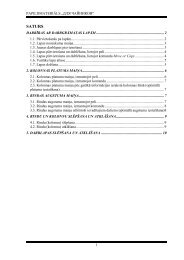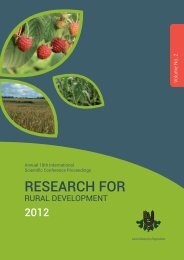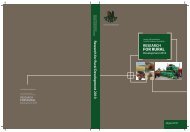LATVIA UNIVERSITY OF AGRICULTURE - Latvijas ...
LATVIA UNIVERSITY OF AGRICULTURE - Latvijas ...
LATVIA UNIVERSITY OF AGRICULTURE - Latvijas ...
- No tags were found...
Create successful ePaper yourself
Turn your PDF publications into a flip-book with our unique Google optimized e-Paper software.
FOOD SCIENCESPreliminary RESULTS of 1-Methylcyclopropene Influenceon Apple Quality During STORAGEKarina Juhnevica 1,2 , Liga Skudra 2 , Mara Skrivele 1 , Dalija Seglina 1 , Gita Skudra 21Latvia State Institute of Fruit-Growing2Latvia University of Agriculturee-mail: karina.juhnevica@lvai.lvAbstractApples are the most popular and common fruits in Latvia. Storage technology is crucial to preserve fruit quality aslong as possible. Choosing the appropriate gas content of the storage environment can prolong storage life two tothree times for apples. The aim of the research was to compare six different type of apple grown in Latvia, whichwas stored in diverse conditions. All experiments were performed at Latvia State Institute of Fruit-Growing through2011 – 2012. For fruits before storage, 1-methylcyclopropene (1-MCP), which blocks the emission of ethylene, wasused. Apples were stored in a cooler and in ULO type plastic bags in a modified environment with two differentgas contents. The temperature of the environment was +2 ±1 °C with 90% relative humidity. Changes in physicochemical(soluble solids, total acids and flesh density) indexes were examined before and during the storage. Theresults showed 1-MCP has a positive effect on quality preservation of fruit. Fruits stored in ULO type plastic bags(gas content: 1.5% O 2and 2.5% CO 2) had the best results in preservation of physico-chemical indexes. Examinationof results revealed that physico-chemical indexes changed the most in samples stored in the cooler.Key words: acid, density, soluble solids, 1-MCP, ULO.IntroductionFresh fruits are the basis of a healthy dietbecause they supply human body with the necessarybiologically active elements. Apples contain organicacids like apple and citric acids (0.2 - 0.7%) whichis why they have sour taste (Dofer, 2006). Theamount and content of vitamins are closely related tostorage time and conditions. Storage in non-modifiedenvironment with lowered temperature for six monthsresults in the decrease of the amount of C vitamins by~50%, whereas it does not significantly affect vitaminsof group B, microelements and fibres (Wilkinson,Perring, 2006). Chemical composition and qualitychanges depend on apple cultivar, growing conditions,and harvesting time. If fruits are not ripe enoughbefore the storage they dehydrate more intensively,but if harvested too late apples will rot during or justafter the storage. Shelf life period would be very shortfor such apples (Sfakiotakis et al., 2008).For the last 50 years fresh fruits are storedin modified gas environment all over the world.Modified gas environment allows storing them for upto one year (Akbudak et al., 2002). According to Foodand Agriculture Organization of the United Nations,79% of apples grown in Europe are stored in modifiedatmosphere. However, it has several drawbacks, forexample flavour does not develop and the colour ofapples remains exactly the same as at the beginning ofthe storage. It is advised to sell the fruits within a monthafter the storage. If the gas content of the modifiedenvironment is chosen incorrectly, the unpleasant hintof taste and flavour, and physiological disorders, suchas skin burn, flesh breakdown and conducting tissuebrowning can develop (Marin et al., 2009).Ten years ago, scientists from North CarolinaUniversity, USA, discovered a substance –methylcyclopropene (1-MCP) - which reacting withwater emits a gas that blocks the emission of ethylene.Ethylene is a substance responsible for apple agingprocess, but 1-MCP blocks its effect so qualityindexes of the fruits can be preserved (Beaudry,Watkins, 2003). It has been five years from now since1-MCP is used on an industrial scale. According toEuropean Food Safety Authority EFSA, MCP wasused for storage of vegetables and cut flowers in 26countries in 2010. During five years of research theeffectiveness of 1-MCP has been proved. In orderto use the 1-MCP it is essential to determine theprecise level of ripeness of apples, processing mustbe performed in airproof environment and total fruitmass and cabinet capacity ratio must be considered(Watkins et al., 2008). Until now, no research has beenconducted on the effect of 1-MCP on apple qualityduring the storage in Latvia. The aim of the presentedstudy was to investigate preliminary results of applestorage in different conditions.Materials and MethodsExperiment schemeThe research was conducted in the Unit of Fruitand Berry Experimental Processing of Latvia StateInstitute of Fruit-Growing. Six apple cultivar fruitsof the 2011 yield were used: ‘Auksis’, ‘Orlik’,‘Antej’, ‘Zarja Alatau’, ‘Belorusskoje Malinovoje’,and ‘Sinap Orlovskij’. Before storage, fruits weretreated with 1-MCP that was diluted with water at1:30 ratio in a conical flask. After dilution, the flaskwas immediately closed as well as the processing98 Research for Rural Development 2012


